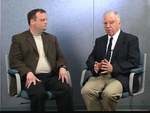These videos consist of a series of questions answered by Dr. Maxwell and Dr. Sacer on the issue of Christology in Dogmatics.
-

01 - Introduction
David Maxwell and David Scaer
Drs. Scaer and Maxwell introduce themselves and give a brief biography.
-

03 - How important is Christology?
David Scaer
Dr. Scaer explains why Christology is important to understand.
-

04 - How do we know about Jesus?
David Scaer
Dr. Scaer views the Gospels as both writings about Christ and historical documents.
-

05 - Does each denomination understand the person of Jesus in the same way?
David Scaer
Dr. Scaer explains that reformed churches often do not see Jesus’s divinity to be accessible through the human side.
-

06 - What is the relationship between Christ and the Scriptures?
David Scaer
Dr. Scaer explains that we need to accept both scriptures and Christ at the same time.
-

07 - Is the Old Testament different from the New Testament in how it handles Christology?
David Scaer
Dr. Scaer explains that without the Old Testament we cannot see the fulfillment in the New Testament of the promises and hopes of the Old Testament.
-

08 - What does Old Testament Christology have to do with typology and messianic prophecies?
David Scaer
Dr. Scaer explains that we should be ready to find Christ in all places in the Old Testament.
-

09 - What problems in Christology have persisted?
David Scaer
Dr. Scaer reviews the misunderstandings of Christ divinity since he preached in Galilee.
-

10 - Which way of referring to Jesus is better?
David Scaer
Dr. Scaer explains that Christ Jesus is the correct way to refer to Jesus because Christ is his title.
-

11 - What did the apostles say about Jesus?
David Scaer
Dr. Scaer explains that the Apostles told the people about the facts regarding Christ in that he died for their sins, resurrection through faith, and Jesus was the Christ.
-

12 - What is an apostle and what is ther significance for Christology?
David Scaer
Dr. Scaer explains the difference between apostles and disciples.
-

13 - What role do the creeds play in Christology?
David Scaer
Dr. Scaer explains why we have creeds and use them in the Lutheran church.
-

14 - What is the significance of the differences between the creeds with respect to Jesus?
David Scaer
Dr. Scaer explains why we have the Nicene and Apostles Creed.
-

15 - What is the relation of Christology to the doctrine of the Trinity?
David Scaer
Dr. Scaer explains that we cannot receive or pray to the other parts of the Trinity except through Christ.
-

16 - What effect does the Eastern Orthodox omission of the filioque have on their Christology?
David Scaer
Dr. Scaer discusses the phrase from the Nicene Creed "and the Son" and how it should be viewed.
-

17 - What is the Lutheran doctrine surrounding the virgin birth and its implications for Christology?
David Scaer
Dr. Scaer explains the difference between the virgin birth and Immaculate Conception.
-

19 - At what moment did Jesus become God?
David Scaer
Dr. Scaer explains that Jesus became God at conception.
-

20 - What does John mean when he calls Jesus the Word of God?
David Scaer
Dr. Scaer explains that Christ is the Word of God and lived among us as Jesus but was from the beginning of the world.
-

21 - Which sections of the Bible show that Jesus is God?
David Scaer
Dr. Scaer explains that the entire New Testament shows Christ as God.
-

22 - What do the I am statements of Jesus mean?
David Scaer
Dr. Scaer explains that the "I am" statements by Jesus draws a direct line back to God in the Old Testament when God tells Moses "I am".
-

23 - Are there different ways in which different passages speak of Jesus as God?
David Scaer
Dr. Sacer explains the names Jesus and Immanuel and their importance to identifying Jesus as the Christ and his deity.
-

24 - What do various terms describing Christ mean?
David Scaer
Dr. Sacer explains the three genus of Christ and how they came into being used.
-

25 - Is there a reciprocation of attributes between the two natures?
David Scaer
Dr. Sacer explains what the life of Jesus might have been like and as God he knew everything but as a man he grew and learned.




